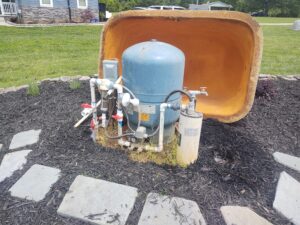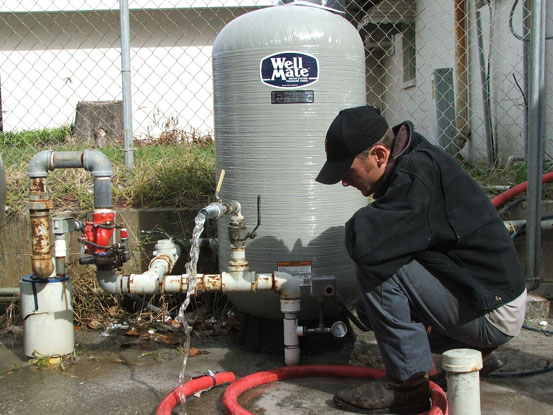High-grade Water Filtration Systems: Ensuring Tidy and Pure Consuming Alcohol Water
Wiki Article
Comprehending the Trick Parts of Effective Water Filtration Solutions

Importance of Water Filtration Systems
Water filtration systems play a crucial role in making sure accessibility to risk-free and tidy drinking water by effectively getting rid of contaminants and contaminations. These systems are crucial in dealing with the expanding concerns over water quality and the potential health and wellness threats related to taking in infected water. By making use of different filtering systems such as reverse osmosis, triggered carbon, and UV sterilization, water purification systems can efficiently remove harmful substances like microorganisms, viruses, hefty steels, and chemicals from the water.Moreover, water purification systems assist to boost the taste and smell of water by removing chlorine, sediments, and various other toxins that can impact its quality. Water Filtration Systems. This improvement in water quality not only makes it much more tasty yet also motivates individuals to consume a sufficient amount of water daily, promoting much better hydration and general health
Kinds Of Purification Elements

Physical filters are made to physically strain out contaminations from the water. These filters can be made of materials like ceramic, carbon, or perhaps sand, and they function by trapping fragments larger than the filter's pores as water goes through.
Chemical filters utilize various chemical processes to eliminate contaminants from the water. Instances consist of triggered carbon filters, which adsorb contaminations, and reverse osmosis membrane layers, which make use of pressure to different pollutants from the water.
Organic filters make use of living microorganisms like bacteria or algae to break down raw material and toxins in the water. These filters are often used in wastewater treatment plants or all-natural water filtration systems.
Understanding the different kinds of purification components is essential for choosing one of the most appropriate water purification system for particular purification demands.
Function of Sediment Filters
Sediment filters play an important duty in water filtration systems by effectively recording strong bits put on hold in the water. These filters are generally the very first line of protection in a filtration system, removing larger bits such as sand, silt, dirt, and rust before the water relocates through finer filtration stages. By trapping these sediments, the filters prevent them from getting to downstream components, thus expanding the lifespan and effectiveness of the entire system.The function of debris filters is important in keeping water top quality and protecting sensitive equipment from damages created by debris. In addition, by getting rid of noticeable fragments, sediment filters improve the clarity and taste of the water. Regularly cleaning or changing sediment filters is necessary directory to make click site certain ideal performance. Neglecting this upkeep can bring about obstructing, decreased water flow, and endangered purification performance. Overall, sediment filters are crucial parts that contribute considerably to the effectiveness of water filtration systems.
Function of Turned On Carbon Filters
Playing a crucial function in water filtration systems, turned on carbon filters are crucial in getting rid of pollutants and pollutants from the water supply. As water passes via the filter, the activated carbon brings in and holds onto the impurities, guaranteeing that the water that comes out on the various other side is cleaner and more secure for usage.Turned on carbon filters are extremely reliable at improving the preference and smell of water by decreasing chemicals that can influence its top quality. They are additionally qualified of getting rid of particular hefty metals like lead and mercury. Furthermore, these filters can help avoid the build-up of bacteria and algae in water, additional enhancing its total high quality. Due to their versatility and reliability, turned on carbon filters are a key part in ensuring that water is cleansed to the highest possible requirements before reaching consumers.
Comprehending Reverse Osmosis Solutions
Reverse osmosis systems are sophisticated water purification systems that utilize an innovative process to get rid of pollutants and contaminations from drinking water. These systems function by using stress to the water, requiring it with a semi-permeable membrane. This membrane layer functions as a barrier, enabling only distilled water molecules to pass through, while obstructing larger molecules such as minerals, chemicals, and other contaminations. Because of this, the water that appears on the various other side is significantly cleaner and more secure for consumption.One secret advantage of reverse osmosis systems is their capability to eliminate a variety of impurities, including heavy metals, dissolved bacteria, solids, and viruses. This makes them extremely reliable in enhancing the overall high quality and safety and security of drinking water. Furthermore, reverse osmosis systems are relatively low-maintenance and can be installed under the sink or in a central filtration system, offering hassle-free accessibility to tidy water throughout the home. Overall, recognizing just Homepage how reverse osmosis systems work can assist individuals make informed choices regarding their water purification demands.
Conclusion
Finally, effective water filtration systems are essential for making certain clean and secure drinking water. The crucial components of these systems consist of debris filters, turned on carbon filters, and turn around osmosis systems. By understanding the function and duty of each component, people can make educated choices when choosing a water filtering system. It is essential to focus on the quality of water in order to advertise total health and wellness.Water filtration systems play a crucial role in making sure access to secure and clean alcohol consumption water by effectively eliminating pollutants and pollutants. By making use of numerous filtration mechanisms such as reverse osmosis, triggered carbon, and UV sanitation, water purification systems can efficiently remove damaging substances like microorganisms, infections, heavy metals, and chemicals from the water supply.
Debris filters play a critical function in water filtering systems by effectively catching solid bits suspended in the water (Water Softeners).Playing a crucial function in water purification systems, activated carbon filters are instrumental in eliminating contaminations and contaminants from the water supply.Reverse osmosis systems are innovative water filtration systems that employ a sophisticated process to remove pollutants and pollutants from alcohol consumption water
Report this wiki page